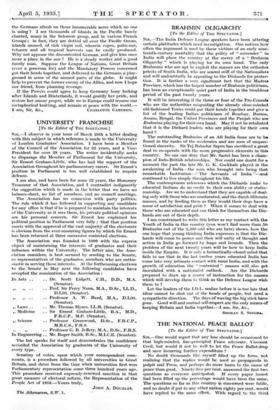• BRAHMIN OLIGARCHY
[To the Editor of THE SPECTATOR.]
Sin—The India Defence League speakers have been uttering certain platitudes 'which need investigation. One notices how often the argument is used by these victims of an early nine- teenth-century mentality that the policy of " surrender " in India will place the country at the mercy of a "Brahmin Oligarchy" which is playing for its own hand. The only Brahmins who are apt to exploit the masses are the orthodox priests of South India, who are seared stiff of the Nationalists and will undoubtedly be appealing to the Diehards for protec- tion. It is further a very significant fact that the Madras Province, which has the largest number of Brahmin politicians, has been an exceptionally quiet part of India in the troublous period of the past twenty years.
It will be interesting if the three or four of the Pro-Consuls who are the authorities misguiding the already close-minded old-fashioned Tories could put their heads together and give a list of the leading Indian politicians of Bombay, Burma, Assam, Bengal, the United Provinces and the Panjab who are Brahmins playing for their own hand. May it not be retaliated that it is the Diehard leaders who are playing for their own hand ?
The outstanding Brahmins of an All India fame are to be found in the ranks of the moderates and are men of unques- tioned sincerity. Sir Tej Bahadur Sapru has sacrificed a great deal to co-operate with the more progressive elements in this country: No one can deny that Mr. Sastri has been a cham- pion of Indo-British relationships. Nor could one doubt for a moment the part the late Mr. G. K. Goekhale played in the awakening of India—the man who brought into being that remarkable Institution—" The Servants of India "—and continued to liVe simply throughout his life.
The contemptuous references which the Diehards make to educated Indians do no credit to their own ability or states- manship. Are we to understand that they are capable of deal- ing only with those who are uneducated, and the dumb illiterate masses, and by feeding them as they would their dbgs have a sense of satisfaction and pride? When it comes to deal with those who are educated and can think for themselves the Die-• herds are out of their depth.
I am constrained to write this letter as my contact with the Youth of India in this country (you won't find more than 50 Brahmins out of the 2,500 odd who are here) shows, how the one hope that young thinking India expresses is that the Die- hards will come to power and then will unity of thought and action in India go forward by leaps and bounds. Then the problem of the next twenty years will be how to keep India inside the Empire. It is only a hermetically-closed mind that fails to see that in the last twelve years educated India has come into very intimate contact with rural India, and with the growth of education the " contented " masses will also get inoculated with a nationalist outlook. Are the Diehards prepared to draw up a course of instruction for the masses which will develop them to think as the Defence League wish them to ?
Let the leaders of the I.D.L. realize before it is.too late that ideas cannot be shot out of the heads of people, but need a sympathetic direction. The days of waving the big stick have gone. Good will and mutual self-respect are the only means of keeping Britain and India together.—I am, Sir, &e.,
SHORAN S. SINGHA.










































 Previous page
Previous page